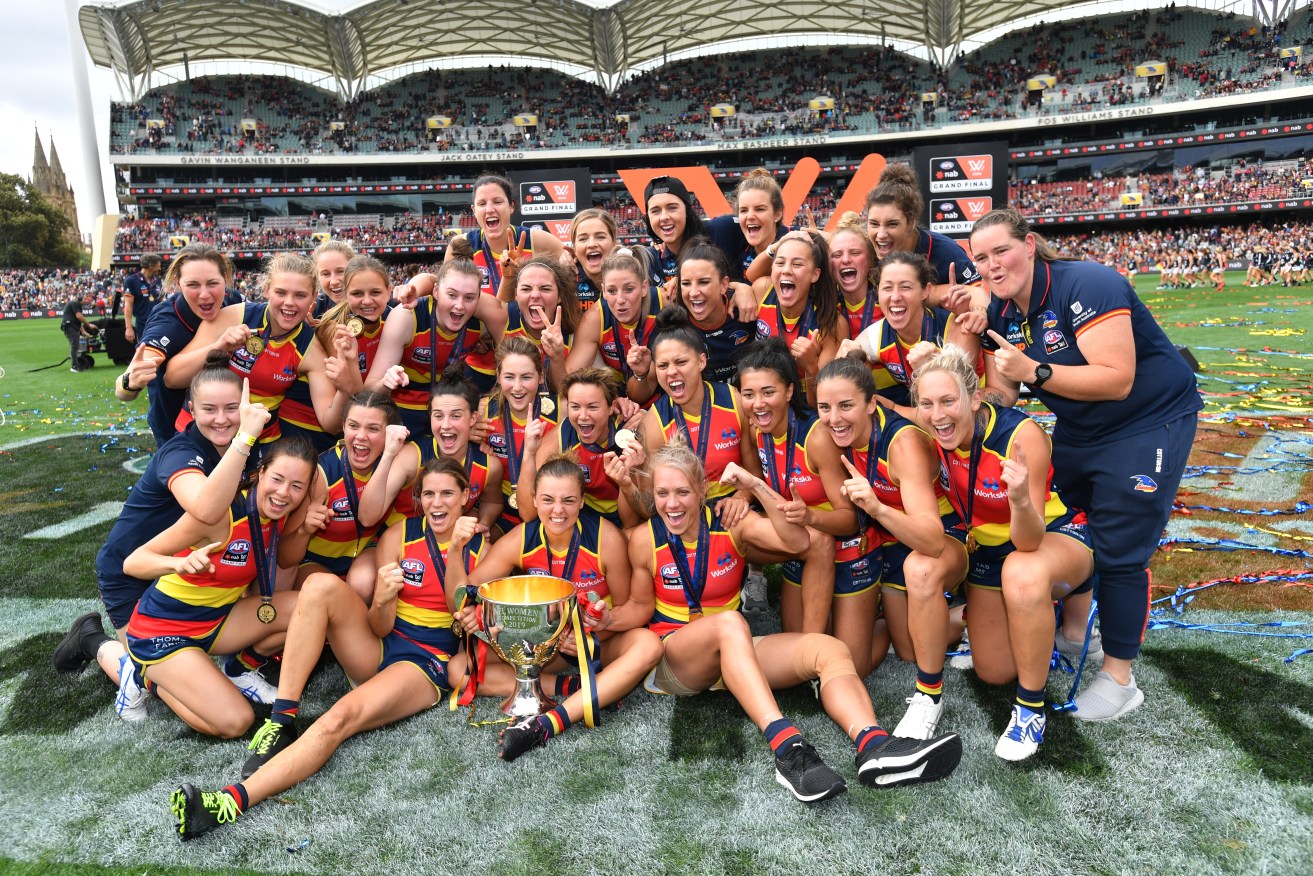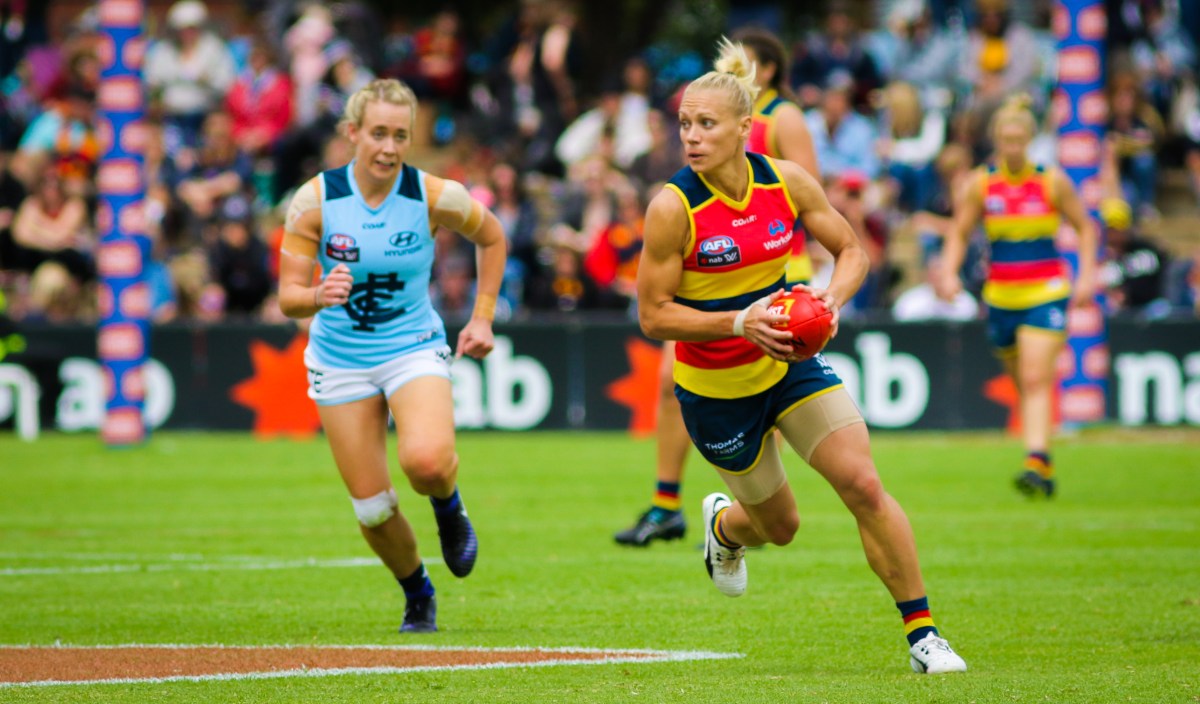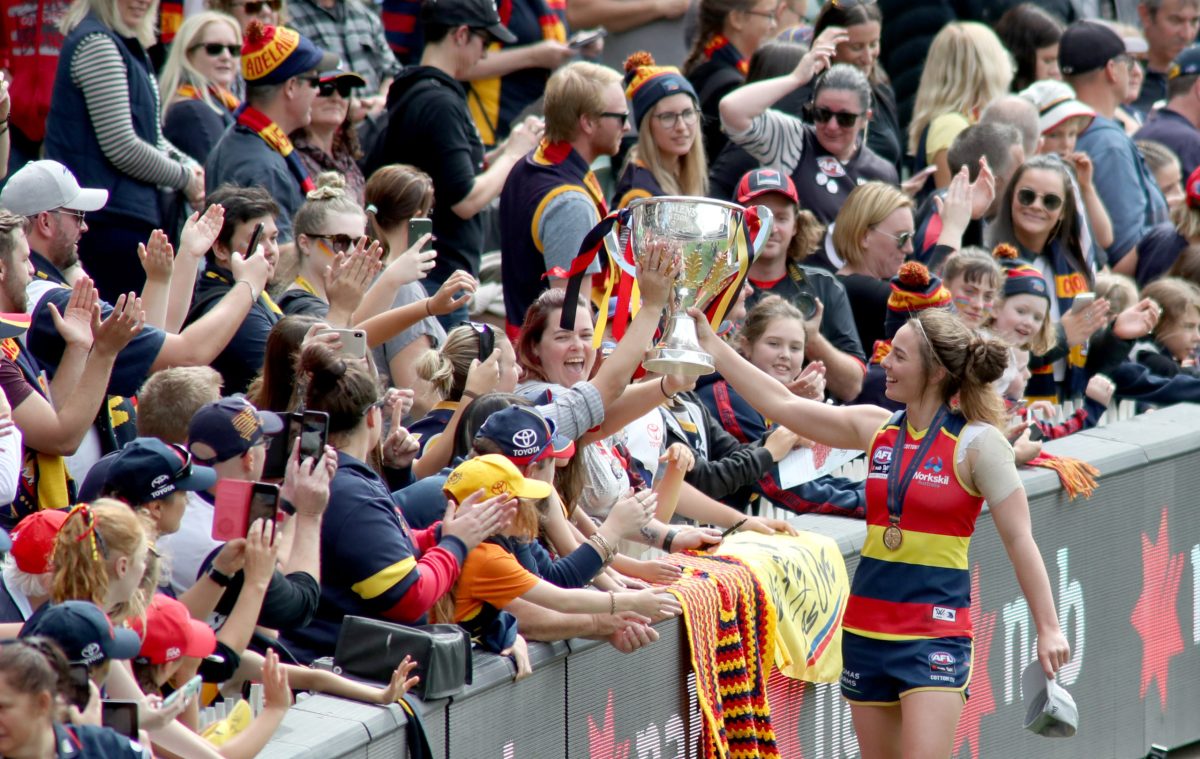Did Port Adelaide miss AFLW boat while on the road to China?
As the Crows bid for a third AFLW premiership in five years and attract more young fans, Port Adelaide faces questions over whether it erred in chasing China instead of a golden opportunity in its own backyard. Michelangelo Rucci reports.

The Crows celebrate their 2019 AFLW Grand Final win over Carlton at Adelaide Oval. Photo: AAP/David Mariuz
For the first time, there is not an emphatic and quick response from Port Adelaide Football Club president David Koch to the question of the moment: “Did Port Adelaide err in ‘missing the boat’ with the AFLW by preferring to march to China?”
Port Adelaide premiership hero Kane Cornes thinks so. As does former State Treasurer and devoted Port Adelaide fan Tom Koutsantonis, who has watched his two daughters wear Crows jumpers while the in-town rival has dominated the pioneer era of AFLW competition with two flags and a third grand final appearance on Saturday.
“My hands shake when I hand over my hard-earned money to buy Crows gear,” says Koutsantonis, a long-time objector to Port Adelaide being in China rather than wooing the young women who have made the AFLW the biggest-growing league in Australian sport in the past five years.
“No … I don’t think so,” Koch told InDaily this week, as the Adelaide Football Club prepared for a rematch of the inaugural 2017 AFLW grand final against Brisbane, this time at Adelaide Oval.
“Yes, the Crows have made a success of the AFLW. But I am not overly concerned.
“Hindsight is a great thing. No-one predicted there would be a pandemic,” adds Koch of the COVID-enforced lockout that has Port Adelaide missing out on its Shanghai AFL clash with St Kilda for the second consecutive year.
Port is destined to also be among the last two of 18 AFL clubs, along with Sydney, to claim an AFLW licence.
Koutsantonis will take his 10 and seven-year-old daughters to Adelaide Oval on Saturday afternoon, and wonder how many other Port Adelaide-devoted fathers are watching their daughters ignore longstanding family tradition to become Crows fans.
“It pains me to see Greg Phillips, a Port Adelaide icon, in a Crows jumper,” says Koutsantonis. “But I understand he is there to support his daughter (inaugural Crows AFLW captain Erin Phillips). He has to be by his daughter’s side. I am doing the same. But it hurts.”

Erin Phillips. Photo supplied
Koutsantonis has no doubt Port Adelaide erred, and said as much on social media well before COVID wrecked Port Adelaide’s immediate plans in China.
“Yes! Yes, Port Adelaide should have put AFLW ahead of China,” Koutsantonis told InDaily. “I know it is not their fault that there is a pandemic. But Port Adelaide’s appeal is in being a broad-based club. That appeal would have been stronger with women’s football in the AFLW.
“My daughters are following the Crows and I am not going to stop them. They have female role models from that Crows AFLW team. I wish they were wearing black-and-white jumpers (of Port Adelaide) rather than those Crows guernseys.
“Women’s sport is so important, so yes, yes Port Adelaide has missed the boat.
“I said at the very beginning (2017) that whichever team recruited Erin Phillips would win the premiership in the first year (of the AFLW). She leaves a great legacy at Adelaide, when it should have been at Port Adelaide.”
Koch is not so regretful of Port Adelaide’s decision to back China ahead of the AFLW, particularly when the corporate deals that followed from the annual AFL match at Shanghai have delivered an ongoing 10 per cent boost to his club’s once-troubled revenue streams.
Port Adelaide’s COVID-hit revenue in 2020 still exceeded that of the Crows ($39.6 million to $38.4 million).
And true to the optimistic entrepreneur Koch seeks to be away from football, he mimics the boy who faces a difficult choice saying: “Why can’t I have both?”
“Port Adelaide – and the AFL – will have a bigger commitment to China at the end of this pandemic,” Koch said. “We will have a big role to play in rebuilding relationships between Australia and China.
“And we have made it clear to the AFL Commission that we have a very keen interest in holding an AFLW licence. When we get it, we will not be playing catch-up to anyone. We will be leading the way by benefitting from all we are doing today at the grassroots of girls’ football.”
Port Adelaide has established a “next generation academy” for women’s football and built a strong link with indigenous girls playing football in the annual Power Cup carnival.
“We already have had a few of those girls drafted to the AFLW,” Koch said. “At the grassroots we are well connected with girls playing football.
“And as a club we are well prepared to make a statement once we have an AFLW team. We are determined to make our first AFLW coach be a woman and have a predominantly female coaching staff. It is paramount we do such. It seems crazy to do otherwise. We are about developing female coaches as well as female players.”
Koch remains frustrated by the SANFL repeatedly not endorsing Port Adelaide’s wish to set up its AFLW program through the State league SANFLW.
“They refuse to invite us to that competition when we want to be a part of it,” Koch said. “We push on with our own plans, like the redevelopment of the Alberton Oval precinct, which is to be a focal point of our development programs for young women wanting to play Australian football.”
But when will Port Adelaide be part of the national women’s league that had its launch date advanced from 2020 to 2017 by AFL chief executive Gillon McLachlan?
The AFL Commission next week will collect a review paper that recommends the 14-team AFLW complete its Victorian component by endorsing Essendon and Hawthorn’s applications to compete in the 2022 season. This will keep Port Adelaide – and Sydney – on hold until at least 2023.
Koch says Port Adelaide is not losing financially by its absence from the AFLW competition. The club’s strong performances in the AFL men’s competition has strengthened Port Adelaide’s appeal for meaningful corporate sponsorships.
But Koch concedes – as Koutsantonis points out – there is the risk of losing young fans in the home market.
“Maybe, yes, but we dealt with that in the AFL too,” says Koch referring to the seven-year headstart Adelaide had on Port Adelaide in the national men’s competition.
Former Adelaide Football Club chief operating officer Nigel Smart describes the need for AFLW exposure as “super important” for an AFL club.
“Sponsorship-wise, we brought in new partners who wanted to make a strong statement on diversity; Workskil and BHP,” Smart told InDaily. “But there also is the cultural aspect of AFLW. You develop a new supporter base, and sponsors know how women have a significant say in how a household budget is spent.
“For the Adelaide Football Club, AFLW has been terrific in amassing a new generation of fans. You can imagine grandparents and parents who come from long lines of Port Adelaide fans dealing with granddaughters and daughters who want to play AFLW. And in this State there is only one team that does that – the Crows.

Crow Jenna McCormick with fans after 2019 Grand Final win over Carlton. Photo: AAP/Kelly Barnes
“It would be challenging for Port Adelaide. They need to get involved in the AFLW, and before there is a question posed about holding off further expansion because it would dilute the talent in the league.”
Koutsantonis has softened his first-up tone towards the decision-making process that left Port Adelaide preferring China ahead of AFLW saying: “I don’t know what was going on behind the scenes. If I had a choice, a selfish one at that, I would have picked a Port Adelaide AFLW team before China every time. But I am not sure what the board was dealing with at the time.”
Both Port Adelaide and the Crows in 2015 were dealing with an AFL executive that believed the South Australian market was too weak in talent to support an AFLW team. The AFL endorsed Port Adelaide putting its attention towards financial salvation in China, and ultimately caved in against Adelaide’s late but determined bid to claim an AFLW licence for the 2017 inaugural season.
In winning the AFLW title in 2017, the Crows not only embarrassed the AFL prophecy of failure in Adelaide but also answered the AFL’s wish for a stronger base in women’s football across South Australia.
“We had exponential growth across the State; it was a challenge to find ovals to accommodate all the girls teams wanting to play,” Smart said. “Now with another AFLW grand final in Adelaide the interest this will generate will make the game stronger again.”
This is a tribute to Phillips and also her inaugural co-captain team-mate Chelsea Randall who came to Adelaide to not only live her dream as an AFLW player but also work as the grassroots as a development officer with the SANFL encouraging girls to play Australian football.
Adelaide’s AFLW program chief Phil Harper admires how Randall preferred to work in the tougher South Australian market rather than take up lucrative offers in Melbourne or her home base in Western Australia.
“When we first approached her to come to Adelaide she was living in Western Australia, and her main reason for moving to South Australia was to help develop the game where it was weak – probably the weakest,” Harper said. “Chelsea thought she could make a difference and leave a legacy. She has been instrumental in getting women’s football up and running here.”
The hollow side story of Saturday’s AFLW grand final is Randall not taking the field after suffering concussion in the preliminary final against Melbourne at Adelaide Oval on Saturday and forced to the sidelines by the 12-day concussion protocol.
Inaugural Crows AFLW-premiership coach Bec Goddard describes the league’s fifth season as the best so far – a year that achieved success while fans were charged for their tickets for the first time with a $10 fee.
“The quality (of AFLW) this year is notably better, and that comes from the fitness levels of the players being significantly better. They look like athletes,” says Goddard.
“Adelaide’s work in strength and conditioning has allowed its players to be better in other parts of the game. The big one (in the advancement of the women’s game) is the players’ composure with the football.
“All AFL clubs need AFLW teams now, and I would not have said that in 2017. Then I felt if we went too big too soon we would damage the product. Now we need to get those final four clubs involved as quickly as possible.
“This league is not going backwards – it will be a forward step to have every AFL club involved in the AFLW competition.”
The AFLW’s appeal is highlighted by Hawthorn president Jeff Kennett demanding his club – that shunned the women’s national league at the start – be handed an AFLW licence next season.
Kennett labels any AFL boycott of his club’s submission for an AFLW licence as “discrimination of the worst kind”.
Kennett wrote to his club’s members on Monday saying: “The AFL Commission is meeting on the 1st of May. It will be at this meeting they decide on whether we can enter the AFLW competition next year as we wish and need.
“I cannot believe that we will not get approval to enter the competition. It is just so wrong that we are excluded. Unfair on our women players and members. Be assured if we do not get the green light, it will be discrimination of the worst kind when we are the only women’s team where all our coaches of the women’s team are women, led by the fabulous Bec Goddard.”
Goddard left Adelaide after the AFLW premiership defence ended without a finals appearance in 2018, and last year was denied by COVID the chance to have her program start with Hawthorn’s VFLW team. She is one of the AFLW’s sharpest observers, as noted with her commentary for television network Channel Seven.
Her vision for the AFLW is a league of professional players.
“And the game will be better for full-time players,” says Goddard.
So did the Port Adelaide Football Club miss the boat on AFLW to chase the coin on the Silk Road to China? And as last in the AFLW, will Port Adelaide be worst-placed in the inevitable game of catch-up with the Crows in a genuine race to win the female hearts?
On the latter question, Koch is quick and emphatic in his response: “No! No, we will not only be a leader in women’s football but also women’s sport. By 2023, we will have a deeper involvement in the professional side of women’s sport.
“We are already bigger than most for our presence in grassroots girls sports. We are building our women’s football program from the ground up and that is giving us a very strong foundation on which to build our AFLW team – and more.”




